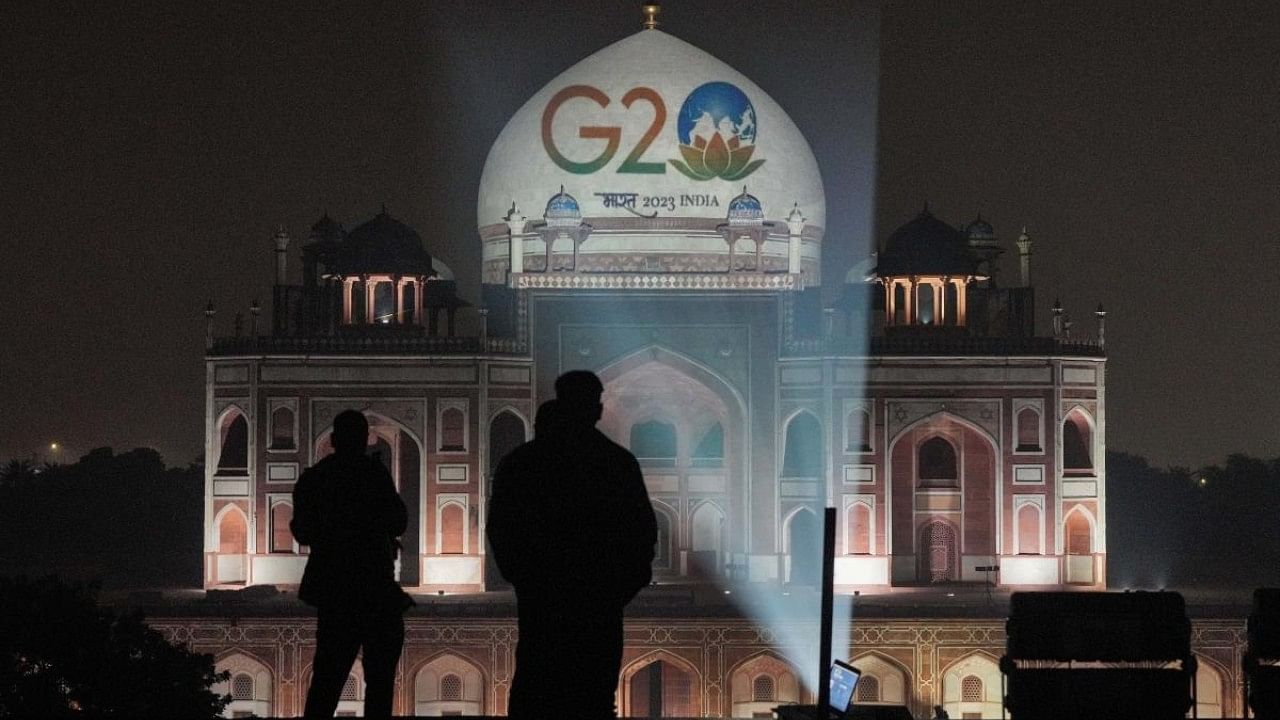
Humayun's Tomb illuminated displaying the logo of G20 Summit 2023.
Credit: PTI Photo
Negotiations for reviving the Black Sea grain deal are likely to continue on the sidelines of the G20 summit in New Delhi this weekend as a meeting between Russian President Vladimir Putin and Turkish President Recep Tayyip Erdoğan failed to restore the agreement brokered by the United Nations.
The West, led by the United States, is likely to use the G20 summit forum to criticise Russia for withdrawing from the grain deal and further aggravating global food insecurity, triggered by Moscow's military aggression against Ukraine – particularly in Africa and Asia.
The US, the United Kingdom, and the European Union have been nudging New Delhi to try and convince Moscow to revive the grain deal – not only because India holds the rotating presidency of the G20 and will host its annual summit on Saturday and Sunday, but also because India's decades-old strategic partnership with Russia remained undisturbed by the geopolitical churning triggered by the war in Ukraine.
A source in New Delhi told DH that Prime Minister Narendra Modi, who will chair the G20 summit, might call for depoliticising the global supply of food, fertilizers and medical products so that geopolitical tensions would not lead to humanitarian crises.
The Black Sea grain deal came into effect on July 22, 2022 – a few months after Russia launched its ‘special military operations’ in Ukraine. The deal, brokered by Türkiye and the United Nations, allowed Ukraine, one of the breadbaskets of the world, to safely export its grain through its southern ports via the Bosphorus without any military aggression or blockage by Russia.
Moscow, however, withdrew from the deal on July 17 this year, alleging that a parallel agreement that promised to remove hurdles for the export of Russian foodgrain and fertilisers had not been honoured and that sanctions and restrictions on shipping and insurance had hit the country’s agricultural trade.
Erdoğan had a meeting with Putin in Russia's Sochi to discuss the revival of the agreement. Russia, however, did not budge from its stand that it would allow Ukraine to export grain across the Black Sea only after the US, the UK and the EU ensured strict adherence to the other agreement on removing obstacles put in place to hinder its agricultural exports.
Putin will not come to New Delhi to attend the G20 summit. Russian Foreign Minister Sergey Lavrov will lead the delegation from Moscow at the annual conclave of the leaders of the premier forum of international economic cooperation.
Lavrov is likely to hold several bilateral meetings on the sideline of the summit and the issue of reviving the Black Sea grain deal is expected to come up during discussion, diplomatic sources in New Delhi told DH. He is likely to claim that Russia has endeavoured to be a reliable supplier of food and energy resources for the rest of the world, notwithstanding sanctions imposed by the West.
The Russia-Ukraine conflict has already cast its long shadow over the G20 summit to be held in New Delhi, particularly on negotiations for the joint declaration proposed to be adopted by the leaders at the end of the conclave. Though the West, led by the US, has been insisting on the inclusion of a statement condemning Russia’s military aggression against Ukraine in the proposed “Delhi Declaration”, Beijing and Moscow have been opposing it, arguing that the G20 was a forum meant to promote international economic cooperation, and not to discuss geopolitical issues.
